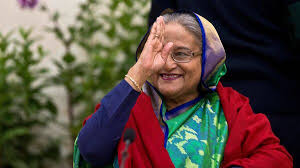Bangladesh Protests Spark End of an Era for Sheikh Hasina’s Rule
Sheikh Hasina’s 14-year rule in Bangladesh came to an abrupt end amidst escalating protests and violence. The unrest, which began in July over job quotas, transformed into a broad anti-government movement demanding her resignation. The turning point came when clashes between protesters and police turned deadly, resulting in an estimated 300 fatalities.
The military, which has significant influence over Bangladeshi politics, likely played a crucial role in Hasina’s departure. Faced with the prospect of further bloodshed and massive protests, the military may have pressured her to step down. Hasina’s decision to flee to India, a long-time ally, was likely influenced by counsel from Indian leaders.
The sudden collapse of Hasina’s regime marks a significant shift in Bangladesh’s political landscape. Her government had grown increasingly authoritarian, and the protests reflected widespread discontent with her rule. As the country navigates this uncertain transition, the military’s role will be closely watched. Will they support a democratic transition, or seek to exert their own influence over the government?
Some additional points to consider:
- The protests were not only about job quotas but also about corruption, economic mismanagement, and human rights abuses.
- Hasina’s government had become increasingly isolated, with many political opponents and activists facing arrest or intimidation.
- The international community, including the United Nations, had expressed concern over the violence and called for restraint.
- Bangladesh’s future remains uncertain, with many questions about who will lead the country and what reforms will be implemented.
In a televised address, General Waker-uz-Zaman, the Chief of Army Staff, declared the establishment of an interim government, effective immediately. He appealed to the public to trust the army’s leadership during this critical period, emphasizing their dedication to safeguarding the nation’s interests and paving the way for a democratic transition.”
“I request you all to be a little patient, give us some time and together we will be able to solve all the problems,” Zaman said. “Please don’t go back to the path of violence, and please return to nonviolent and peaceful ways.”




